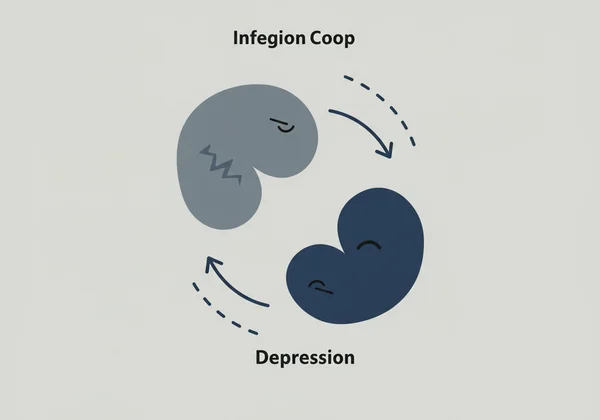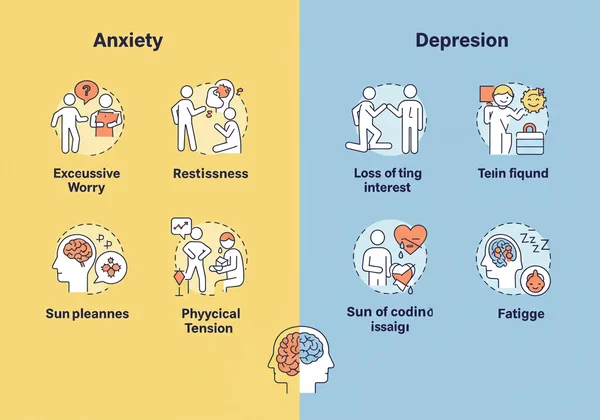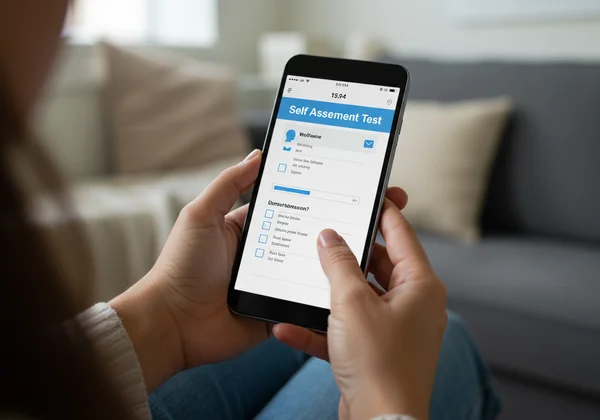Anxiety & Depression Test: Overlap, Symptoms, & When to Test
September 2, 2025 | By Isla Caldwell
Feeling 'off' but not quite sure why? You're not alone. Many people struggle to distinguish between the persistent worry of anxiety and the heavy cloud of depression, or they find themselves caught in the confusing storm of experiencing both at once. This guide is here to untangle the knots, clarifying the common overlaps and distinct symptoms of these two conditions. Most importantly, it will provide clarity on when taking a confidential anxiety and depression test can be a crucial first step. How can I test myself for anxiety and depression confidentially? Let’s explore how a simple self-assessment can be your starting point toward understanding your mental health and finding a path forward. Taking a moment to check your symptoms can provide valuable insights.

Understanding Co-Occurring Anxiety and Depression
It’s incredibly common for anxiety and depression to exist side-by-side. The National Institute of Mental Health (NIMH) notes that these conditions frequently co-occur, creating a complex cycle that can be difficult to break. Understanding this connection is the first step in recognizing the full picture of what you might be experiencing. One condition can often trigger or worsen the other, making a comprehensive approach to mental wellness essential.
Why Anxiety and Depression Often Appear Together
The relationship between anxiety and depression is more than just a coincidence; it's rooted in shared biological and psychological factors. Both conditions are linked to similar neurotransmitter activity in the brain, including serotonin and dopamine, which regulate mood. Furthermore, the chronic stress and worry from an anxiety disorder can be emotionally draining, leading to feelings of hopelessness and exhaustion that are characteristic of depression.
Conversely, the low energy and loss of interest from depression can make you withdraw from activities you once enjoyed. This isolation can fuel social anxiety and worry about the future. It becomes a challenging loop where the symptoms of one condition feed the other, making it feel impossible to find relief. This is why a targeted self-assessment can be so helpful in identifying the primary issues.

Real Stories: Navigating Dual Diagnoses
Consider a composite story of someone like "Jessica," a 25-year-old marketing professional. She first noticed a constant, nagging worry about work deadlines, which soon spiraled into sleepless nights and a racing heart before big meetings. This is classic anxiety. Over time, the relentless stress left her feeling depleted. She lost interest in her hobbies, started declining invitations from friends, and felt a persistent sadness she couldn't shake. The anxiety had paved the way for depression.
This experience of a dual diagnosis is a journey many undertake. Recognizing that you're not just "stressed" or "a little sad" but are dealing with interconnected challenges is a powerful realization. It validates your feelings and empowers you to seek understanding, perhaps starting with a free anxiety test to gain initial clarity.
Symptoms of Anxiety vs. Depression: Key Differences & Overlaps
While they are deeply connected, anxiety and depression have distinct core features. Differentiating between them can help you better articulate your feelings to yourself and, if you choose, to a healthcare professional. Think of anxiety as being stuck in a future-oriented state of fear, while depression is often characterized by a focus on past regrets and a current state of emptiness.

Common Signs of Anxiety: Worry, Restlessness, and Physical Symptoms
Anxiety is defined by excessive fear, worry, and apprehension. It often manifests physically, putting your body in a constant state of high alert. If you're experiencing anxiety, you might recognize these signs:
- Excessive Worry: Uncontrollable and often irrational fears about various aspects of life (work, health, family).
- Restlessness: Feeling on-edge, keyed up, or unable to relax.
- Physical Symptoms: A racing heart, shortness of breath, trembling, sweating, and muscle tension.
- Irritability: Feeling easily agitated or snappy.
- Difficulty Concentrating: Your mind feels like it's "going blank" because it's preoccupied with worry.
Core Symptoms of Depression: Sadness, Loss of Interest, and Energy
Depression, on the other hand, is characterized by a persistent low mood and a profound loss of interest or pleasure in activities. It's more than just sadness; it's an emptiness that impacts your ability to function. Core symptoms include:
- Persistent Low Mood: Feeling sad, empty, or hopeless for most of the day, nearly every day.
- Loss of Interest (Anhedonia): A lack of pleasure in hobbies and activities you once enjoyed.
- Fatigue: A significant decrease in energy, feeling tired all the time, even after sleeping.
- Changes in Sleep or Appetite: Sleeping too much or too little; eating significantly more or less than usual.
- Feelings of Worthlessness: Harsh self-criticism or excessive guilt.
When Symptoms Blur: Shared Experiences
The real confusion for many arises from the symptoms that anxiety and depression share. This overlap can make a self-diagnosis feel impossible and frustrating. Shared experiences often include:
- Sleep Disturbances: Both anxiety (racing thoughts) and depression (lethargy or rumination) can disrupt sleep patterns.
- Difficulty Concentrating: Worry and low mood can both make it hard to focus on tasks.
- Irritability: Feeling agitated is a common symptom in both conditions.
- Physical Aches and Pains: Unexplained headaches, stomach issues, and muscle pain can be present in both.
When these symptoms blur, an objective tool like an online anxiety assessment can help you start to parse through the noise and identify patterns.
When to Consider an Anxiety and Depression Self-Test
If you're reading this article and nodding along, it might be time to consider a self-test. A self-assessment isn't about labeling yourself; it's about gaining information. It’s a private, personal step you can take to move from a place of confusion to one of clarity. The goal is to better understand your emotional health.
Recognizing the Need for Self-Assessment
How do you know when it's time to check in with yourself? Consider a self-test if your feelings of worry, sadness, or stress have become persistent and are starting to interfere with your daily life. If your mood is impacting your work performance, your relationships, or your ability to simply enjoy your day, that's a clear sign that it's worth exploring further. Answering the question "Do I have anxiety or am I just stressed?" is a valid and important first step.
The Role of Our Confidential Anxiety Test
This is where a tool like ours becomes invaluable. Our platform provides a confidential anxiety test based on scientifically validated screening scales like the GAD-7. It’s designed to be a quick, accessible, and completely private way to quantify your symptoms. There's no need to register, and your data is never stored.
Beyond just a score, we offer a unique, optional AI-powered analysis that provides deeper, personalized insights into your strengths, challenges, and actionable next steps. It transforms a simple score into a meaningful report, helping you understand your mental health on a new level.

What an Online Anxiety Test Can (and Cannot) Tell You
It is crucial to have the right expectations. An online screening tool is an excellent first step for self-reflection. It can help you identify patterns, give you a baseline understanding of your anxiety level, and provide you with the language to describe what you're feeling. It can give you an anxiety score that serves as a snapshot of your current state.
However, it is not a medical diagnosis. A formal diagnosis of an anxiety disorder or depression can only be made by a qualified healthcare professional, such as a doctor, psychiatrist, or psychologist. Think of our test as a reliable, informative starting point—a tool to help you decide if a conversation with a professional is the right next step for you.
Ready for Clarity? Take Your Free Anxiety Assessment
Navigating the complexities of anxiety and depression is a deeply personal journey. The confusion caused by their overlapping symptoms can be isolating, but you don't have to stay in the dark. Understanding the differences, recognizing the overlaps, and knowing when to seek more information are powerful acts of self-care.
If this guide resonates with you, your first step towards clarity is just a few clicks away. We invite you to take the test on our homepage. It's free, completely anonymous, and takes less than three minutes. Get instant insights and an optional, personalized AI-driven report to help you understand your feelings and empower your next steps.
Frequently Asked Questions About Anxiety & Depression Testing
Do I have anxiety or am I just stressed?
Stress is typically a response to a specific external trigger (like a work project) and subsides once the trigger is gone. Anxiety, however, is more persistent and internal—it's a lingering worry that often remains even without a clear reason. If your feelings of worry and physical tension are chronic and interfere with your life, it may be more than just stress, and a self-assessment could be insightful.
How accurate is an online anxiety test for comorbidity?
Online tests like ours, which are based on clinical scales such as the GAD-7, are highly effective as screening tools. They are designed to accurately detect the presence and severity of anxiety symptoms. While our test focuses on anxiety, the detailed AI report can often highlight patterns that may suggest overlapping issues, giving you a strong indication of whether you might be dealing with symptoms of both anxiety and depression. To gain clarity now, try our confidential test.
What if my anxiety score and depression indicators are high?
A high score is not a reason to panic; it is a reason to take action. It's a sign that your mental health needs attention, just as a high temperature would. We recommend using this result as a catalyst to speak with a healthcare professional. You can share your report from our anxiety assessment test to start a productive conversation about treatment options, such as therapy or medication.
How can I test myself for anxiety and depression confidentially?
Privacy is our top priority. On our platform, you can test yourself with complete anonymity. We do not require any registration, email, or personal information. Your results are displayed instantly on your screen and are not stored. This allows you to explore your mental health in a safe, secure, and private environment, right from your own device. You can start your free test anytime.